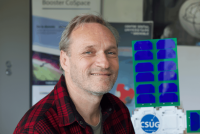Q: Cape Town narrowly avoided “Day Zero” in 2018. How important is it to prepare for a worst-case scenario?
GZ: Day Zero was a scary prospect for Cape Town, but also an important example for the rest of the world. We are acutely aware of the impacts of climate change, such as increasing variability in rainfall and increasing extreme events, and so cities around the world need to grapple with what it means to have extended droughts. However, cities do not always have the necessary capacities or resources in place before these events happen—this pushes the boundaries of what it means to manage water in a city.
Q: Your research into the Cape Town drought has highlighted some key lessons. How can other cities use these to guard against future shocks and stresses when faced with severe drought?
GZ: One wake-up call in Cape Town was that the water department alone could not deal with the drought, even though it was a water-related shock. Extreme climate events cause city-wide problems that call for cross-sectoral government approaches, but well-established governance mechanisms for multi-sector responses are lacking in Cape Town and many other cities. To set up systems that can manage a complex crisis, cities need to have strong leadership and flexible governance. Another lesson was the importance of establishing partnerships, networks, and alliances before a crisis, which Cape Town had not done. The importance of data also emerged quite strongly; as well as improved system modeling to understand climate scenarios and adapt to future events, there was also a clear need to better understand the lived experience of residents, particularly those in low-income areas. How do people on the ground actually experience the responses that the city is putting in place? Finding ways to input qualitative data—people’s stories—could become more important globally.
Q: An area of interest for the AXA Research Fund is to better understand and support disadvantaged or voiceless communities. How does your work contribute to this?
GZ: The inequality in access to resources in Cape Town emerged quite starkly during the drought. This inequality is undermining resilience in our cities, and the well-resourced do not understand this sufficiently—they want to continue their privileges, but by doing so, are undermining the socio-ecological basis on which everyone’s well-being rests. For example, many wealthy families put in boreholes during the drought to continue having water on their property, but the groundwater table was dropping. It also meant that these households were paying less for municipal water, which compromised Cape Town’s cross-subsidization system for poorer households.
Understanding the lived reality of marginalized groups whose voices are not prioritized is also key to addressing inequality. Together with the Environmental Monitoring Group and Western Cape Water Caucus, my colleagues and I worked with low-income communities who are passionate about improving their local areas and, through our “citizen science” initiative, were able to advance their research skills. We worked together on the SenseMaker project (part of the Community Resilience in Cape Town project) and produced “Making Sense Of A Water Crisis”, a documentary on the process used to capture residents’ stories. Through this work, local actors could build their voices and lobby the government with actual evidence.
Q: How else might your research help local governments strengthen urban water resilience and adapt better to climate risk?
GZ: The theoretical impetus of my work is that we need to strengthen multi-level governance around urban climate adaptation and resilience. For this, governments need to engage with citizens in more creative, inclusive, and intentional ways that move away from the tokenistic participation we have seen in the past. Out of my work in Cape Town has come a greater focus on co-production approaches, where different groups of actors tackle questions together. The importance of “learning” also emerged—when you start collaborating and listening, you begin to see things differently. For example, my theoretical concepts of resilience and adaptation have been useful for the CoCT’s internal learning, and my appointment to the CoCT’s Water Resilience Advisory Committee in 2017 has led to further partnerships and materials that include more diverse perspectives.
Q: What are some of the other barriers to effectively responding to drought?
GZ: Often, there is limited trust between the government and citizens in Southern Africa. To overcome this, governments need to communicate more clearly what is happening inside the government. My work, such as the book “Day Zero” I wrote with Leonie Joubert, has helped to open that up. Citizens also need to hold governments accountable, which is hard if they do not know what the government is actually doing. Another barrier is understanding water catchment from a broader systems approach that appreciates social, economic, and environmental aspects. For example, removing alien vegetation from our water catchment, including eucalyptus and pine, means more available water for the city, but this requires a collaborative approach that government systems are not necessarily set up for.
Q: What meaningful changes would you like to see next?
GZ: Part of the next step is building relationships in between extreme crisis situations. The CoCT is now reaching out to NGOs and local groups to actively listen to challenges and address these, but activists are suspicious as they feel that past requests have fallen on deaf ears. Increasingly, the CoCT is also trying to deal with the high level of informality in Cape Town. These challenges do not necessarily require technological responses, which is what the CoCT knows best, but rather a hybrid of social, political, cultural, and ecological ways of working, and the sector response needs to be broadened to a multisystem approach that enables innovation.
Q: How can cities learn from each other?
GZ: Understanding government responses in Australia, Singapore, and Mexico City was useful to the CoCT when they were deciding how best to respond to the drought, as were international experts who could share different ways of thinking with officials. Yet, during the drought, Cape Town government officials struggled to find information on how other cities had responded to city-wide drought crises in the past. This is partly because the available material is often an internal report or academic papers that officials do not always find accessible. We, therefore, need to create learning networks across cities. We also need to know how to take context-specific information from other places and make it work locally. For example, I recently spent 6 months in California—despite socio-economic differences, drought is a shared issue, and knowledge around groundwater could potentially be exchanged. Groups in Seattle and the University of California Santa Cruz were very supportive and interested in my work on governance and community engagement in South Africa, and I was able to strengthen relationships with people in the California water sector.
Q: From a personal perspective, what has been the most rewarding part of this project?
GZ: I have loved working in my home city to make it a better place for my fellow citizens. Really special has been working as an intermediary between academia and practice over the last few years, and I feel privileged to have supported and learned from the Western Cape Water Caucus and Environmental Monitoring Group, and from people who are exposed in ways that I am not. I won the University of Cape Town’s Social Responsiveness Award in 2020, which was wonderful because the socially responsive angle is what keeps me in academia. I also feel strongly about communication and presenting information in various formats. For example, I put together briefing notes to make the material more accessible to non-academics and was part of the Drought Response Learning Initiative, which filmed interviews of first-hand reflections of the drought from a wide range of perspectives.
Q: What role has AXA played in the success of the project?
GZ: The flexibility that AXA provides meant that when the droughts hit, I was able to throw myself into what was unfolding at the time. Being trusted as scientists without being micromanaged means we can go where the questions are and respond to those. Having the resources to support students and the freedom to fund other products, such as creative communications and transport for NGO members, has also been critical. I am also a big supporter of AXA’s new open access publishing offer, particularly as many of my colleagues across Africa have fewer resources and often struggle to access journals through paywalls.
"Being trusted as scientists without being micromanaged means we can go where the questions are and respond to those."
Q: How do you feel about the sustainability of recent changes in Cape Town?
GZ: My report for the CoCT on building capacity to respond to city-wide stresses such as COVID remained internal, but informed their discussions on structuring the governance of disaster management to better cope with crises like this in the future. I have emphasized the importance of social issues while on the Water Resilience Advisory Committee, and am glad to see that these have been put on the agenda more—this is central to supporting transformative climate adaptation. It has been encouraging to see increased engagement between the CoCT and the Western Cape Water Caucus emerging from the SenseMaker project, but there is a long way to go until we see lives changed substantially for the better.
March 2022
Discover research projects related to the topic
Natural Catastrophes
Joint Research Initiative
Spain
Understanding Wildfire Risk: A Local-Scale Assessment Framework in Chile
Wildfire is a significant hazard across the globe, causing extensive economic, ecological and health impacts. While wildfires are common throughout... Read more

Marcos
RODRIGUES MIMBRERO





